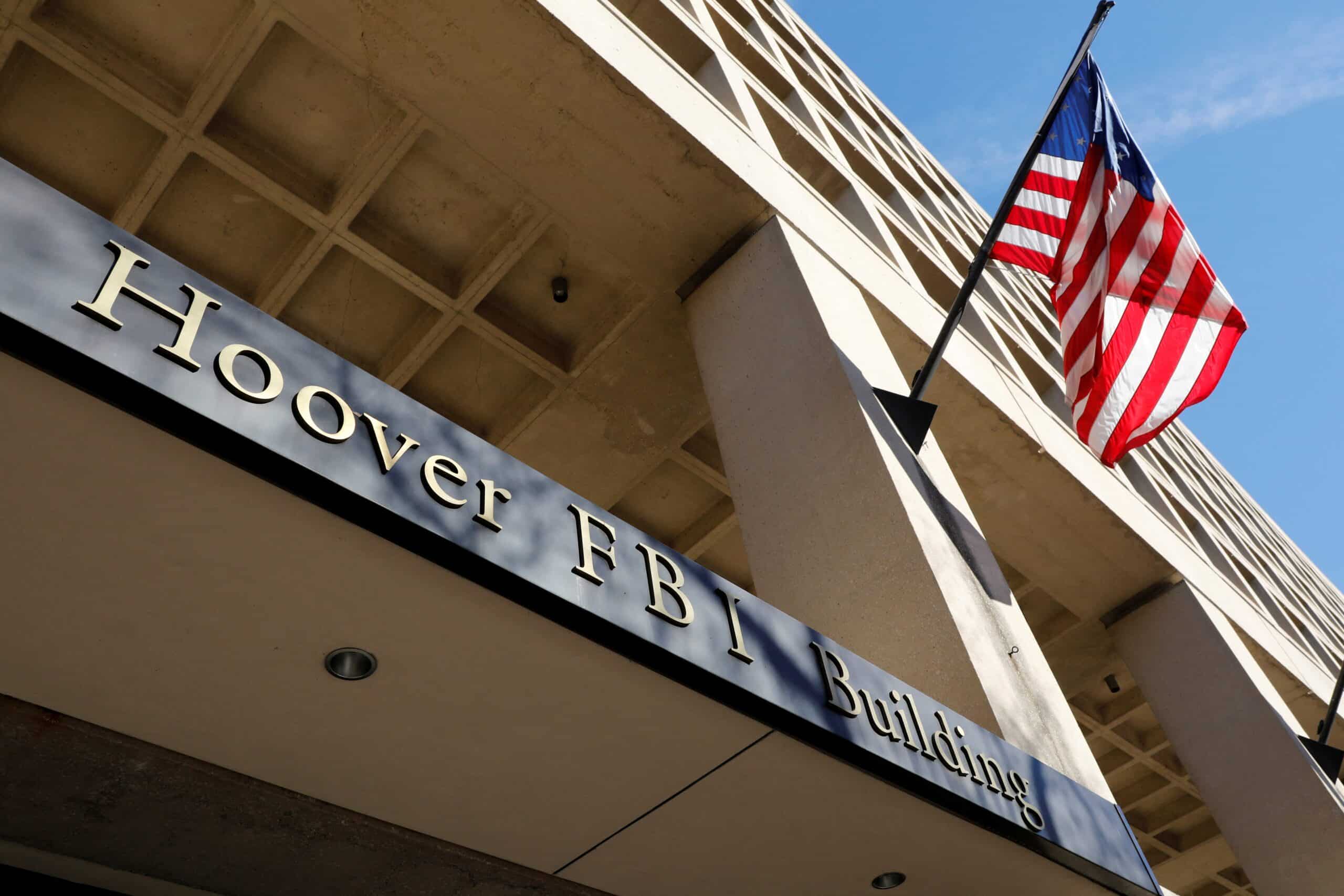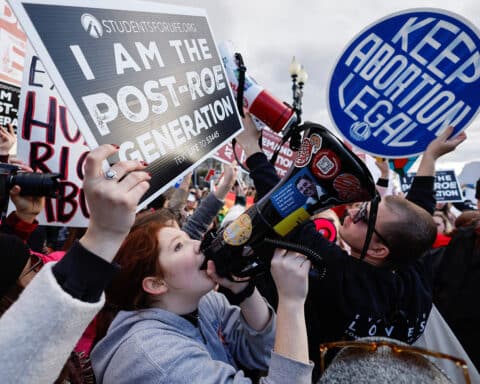WASHINGTON (OSV News) — U.S. senators expressed lingering concern about the creation of a leaked and since-retracted FBI memo that suggested some “radical traditionalist” Catholics pose threats of racially or ethnically motivated violence after a review by the Department of Justice’s watchdog found “no evidence” of religious bias in that process.
Members of Congress requested information about the 2023 document, ordering the Department of Justice Office of the Inspector General to conduct a 120-day review.
OIG report findings
In an April 18 report detailing its investigation, the OIG said although “there was no evidence of malicious intent or an improper purpose,” the document “failed to adhere to analytic tradecraft standards and evinced errors in professional judgment,” creating “the appearance that the FBI had inappropriately considered religious beliefs and affiliation as a basis for conducting investigative activity,” and “reflected a lack of training and awareness concerning proper domestic terrorism terminology.”
Senators among the lawmakers whose inquiries prompted the probe about the memo’s creation were skeptical when OSV News asked them about the report’s findings.
Senator responses
“The FBI’s rabid obsession with undermining peaceful, faithful, practicing Catholics is mind-boggling,” Sen. Ted Cruz, R-Texas, said in April 30 comments to OSV News.
“Referring to these citizens as ‘radical traditionalist Catholics’ simply because of their faith is further evidence that the FBI is unfairly targeting Catholics,” Cruz said. “This rhetoric, and (the) FBI’s anti-Catholic memorandum, threatens the religious freedom of one of America’s largest groups.”
Sen. James Lankford, R-Okla., told OSV News May 1, “No one should be afraid that they are being targeted by the FBI simply because of their faith.”
“I am disappointed that the Inspector General’s review did not address the use of anti-Christian sources by the FBI or adequately address the removal of this document from FBI systems,” Lankford said. “It is a basic American and constitutional right to have a faith and to live that faith — no one should ever live in fear that they will be investigated by law enforcement for living their faith.”
In comments provided to OSV News, Sen. Chuck Grassley, R-Iowa, said, “I appreciate the Inspector General’s work in conducting this review under a tight deadline. However, the report leaves questions unanswered that I and many of my colleagues have been asking of the FBI for over a year.”
“The most important part of this report is what’s not in it, rather than what is,” Grassley said. “Director Wray has failed to sufficiently explain why he described the memo to Congress as a ‘single product,’ when there were two — one internal to Richmond, and one the FBI planned to elevate to the whole bureau nationwide. The FBI has also failed to explain why it ordered the permanent deletion of files related to the memo, or why it continues to use biased sources like the Southern Poverty Law Center. The FBI owes the Senate many more answers regarding this appalling case.”
The Southern Poverty Law Center, based in Montgomery, Alabama, is a nonprofit that describes itself as “a catalyst for racial justice” that works with “communities to dismantle white supremacy, strengthen intersectional movements, and advance the human rights of all people.” SPLC monitors “hate groups” but has faced criticism from some who say the group too widely applies that label.
FBI statement
In a statement provided to OSV News April 19 about the report’s findings, a spokesperson for the FBI said, “We thank the Department of Justice’s Office of Inspector General for its review.”
“The FBI has said numerous times that the intelligence product did not meet our exacting standards and was quickly removed from FBI systems,” the statement said. “We also have said there was no intent or actions taken to investigate Catholics or anyone based on religion; this was confirmed by the findings of the OIG. The FBI’s mission is to protect our communities from potential threats while simultaneously upholding the constitutional rights of all Americans. We do not conduct investigations based solely on First Amendment protected activity, including religious practices.”
In that since-retracted memo dated Jan. 23, 2023, an analyst at the FBI’s Richmond, Virginia, division said that “Radical Traditionalist Catholics” are “typically characterized by the rejection of the Second Vatican Council,” adding the ideology can include an “adherence to anti-Semitic, anti-immigrant, anti-LGBTQ and white supremacist ideology.”
While the memo differentiated between “radical traditionalist” Catholics as “separate and distinct” from “traditionalist Catholics” or Catholics who “simply prefer the Traditional Latin Mass and pre-Vatican II teachings,” some accused the bureau of labeling Catholics as a whole as a threat or unfairly scrutinizing their worship, and accused the Biden administration of unconstitutional religious surveillance.
The memo was retracted by the bureau and repeatedly condemned by both Attorney General Merrick Garland and FBI Director Christopher Wray, the latter of whom was initially appointed to the post by then-President Donald Trump.
Case of Defendant A
According to the report, the FBI opened an assessment of an individual identified as “Defendant A” in 2019, “after he made online statements advocating civil war and the murder of politicians” and was overheard “making comments about political violence while purchasing several AR-type rifles, multiple high-capacity magazines, and large quantities of .223 ammunition.” The individual was later arrested by local police “after he vandalized and slashed the tires of a parked car.” He later demonstrated “increasingly violent rhetoric” while incarcerated. As such, that individual was being monitored by the FBI.
In early 2022, Defendant A began to attend a church “associated with an international religious society that advocates traditional Catholic theology and liturgy but is not considered by the Vatican to be in full communion with the Catholic Church,” the report continued, adding he demonstrated anti-Semetic rhetoric in online conversations about that church, and described himself in his social media profile as “Fascist and Catholic” and a “radical-traditional (rad-trad) Catholic clerical fascist.”
An investigator who identified himself as an FBI agent questioned some members of that community, including its priest, specifically about Defendant A, not their religious practices, the report said, as well as expand the bureau’s “outreach to other area churches to help educate clergy about potential signs that an individual was mobilizing to commit violence and establish a process for reporting suspicious behavior.”
Defendant A was later indicted in federal court on one count of possessing ammunition while a convicted felon and one count of possessing destructive devices, and he pleaded guilty to possessing destructive devices. His sentencing is scheduled for September of this year, according to the report.
Analysts’ intentions and actions
Per the report, in response to the investigation surrounding Defendant A, an analyst was intrigued by that individual’s interest in the church.
The analyst said, “There was no evidence that Defendant A was being radicalized at (the church), because he had been on the FBI’s radar ‘as an unstable, dangerous individual’ before ‘any association with any Catholic related entity whatsoever;’ rather, the concern was that Defendant A was attending (the church) and ‘interacting with a group of people who … may not understand, or know what to do with someone of his caliber or … his mindset,’ and that other (comparable individuals) similarly might be attracted to other parishes.”
One analyst was cited in the report as saying any suggestion that he was motivated by anti-Catholic bias was “patently false,” rather, he sought to “promote outreach to the Catholic Church, in part to protect that community from potentially violent actors.” A second analyst said similarly, arguing the intent behind their actions “was to try to protect these houses of worship by sensitizing them to a potential threat to their congregations.” They said they began drafting the document “in November 2022, following the arrest of Defendant A on state charges.” Asked how they landed on the term “radical traditionalist” Catholic, an analyst pointed to Defendant A using that term online.
The report also found that the employees involved in drafting, editing and reviewing the document “failed to adhere to FBI standards.” In response to the investigation, the report said, the FBI “instituted corrective actions, including expanding training on analytical tradecraft standards and domestic terrorism terminology, enhancing review and approval requirements for intelligence products involving a sensitive investigative matter, and formally admonishing the employees involved.”





